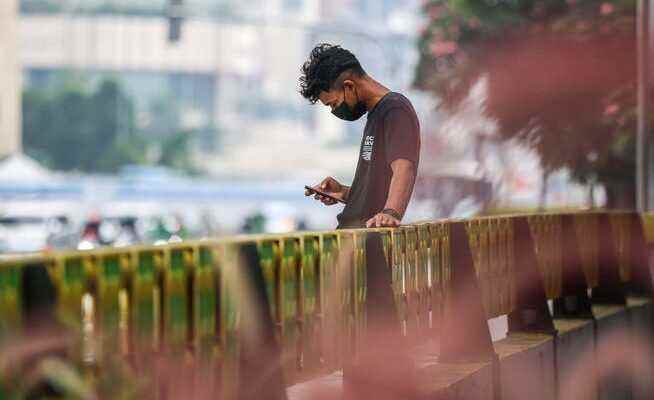Fake news, hate speech, calls for terrorism or the spread of child pornography are a problem in Southeast Asian social networks. However, new measures by the Indonesian government could pose a threat to freedom of expression on the Internet.
In Indonesia (picture from Jakarta) more than 200 million people use the internet. They are mostly active on social media.
The Indonesian government is tightening regulations for national and international Internet companies. Wednesday night is the deadline for registration for a new regulation expired. Noisy “The Jakarta Post» the majority of platform operators have registered.
The Ministry of Communications and Information Technology, which is in charge, said they wanted to start implementing the ministerial decree issued two years ago protect the country and the people. Superficially, the government wants against the spread of misinformationhate speech, radical ideas and also pornographic material.
Vague formulations open up scope
However, the regulation has caused outrage among human rights organizations and advocates for free speech on the Internet. Linda Lakhdhirwho is responsible for legal issues in Asia at the non-governmental organization Human Rights Watch, comments: “The regulation will destroy the right to freedom of expression and should not be applied in its current form.”
Michael Caster of Article 19, a non-governmental organization that campaigns for free speech online, writes that Indonesia is on the verge of one of the most repressive internet regimes to create the world. The new regulation could serve as a model for further repressive laws and measures in Southeast Asia, says Caster.
Use in Indonesia according to the Indonesian Internet Service Provider Association more than 200 million people use the internet. They are mainly active on social networks such as YouTube (139 million users), Facebook (129.9 million), Instagram (99.2 million), Twitter (18.5 million) and Linkedin (21 million); Whatsapp is popular among Indonesians for news services.
According to the regulation, the operators of the Internet platforms must in future have a representative in Indonesia who serves as a contact for the authorities. They also have to assure the Ministry of Communications and Information Technology that law enforcement agencies can access their systems and data without a court order.
A vaguely worded regulation is particularly problematic for freedom of expression on the Internet: the platform operators must remove inappropriate content from the websites within 24 hours by order of the authorities. In particularly urgent cases, they only have four hours; this includes posts that incite terrorism, the distribution of footage depicting the sexual exploitation of children, and content that may cause unrest in society or disrupt public order.
However, the Indonesian government has been vague about what content to remove from the internet. She must have done it consciously. This leaves the authorities with a great deal of discretion, and they can also have posts critical of the government deleted.
Caster from Article 19 also considers the short deadlines for deleting posts to be problematic: Legitimate and legally correct content could possibly be removed from the Internet at the behest of the authorities without thorough examination. Smaller operators of Internet platforms in particular face the problem of implementing the regulation because of the small number of employees.
The market is too lucrative
It is to be feared that companies will, in anticipatory obedience, browse through the content themselves and, if in doubt, tend to delete it in order to avoid problems with the regulator. After a warning and subsequent payment of a fine, they can, in extreme cases, be blocked on the Indonesian Internet for repeated violations. Internet platforms will try to take as little risk as possible in order not to be excluded from a growth market like Indonesia.
Three years ago, the Indonesian government demonstrated how far the Indonesian government is willing to go to protect the sovereignty of interpretation on the Internet. At the time, Jakarta responded to bloody riots between security forces and secessionists in the far eastern province of Papua off the internet for three weeks. The reason given at the time was to prevent the spread of false information.
